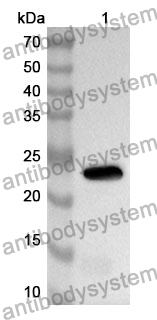Virus-induced RGMa expression drives neurodegeneration in HTLV-1-associated myelopathy., PMID:40305434
Inhibition of repulsive guidance molecule A ameliorates diabetes-induced cognitive decline and hippocampal neurogenesis impairment in mice., PMID:39972167
The potential role of RhoA/ROCK-inhibition on locomotor recovery after spinal cord injury: a systematic review of in-vivo studies., PMID:39956860
Anti-RGMa neutralizing antibody ameliorates vascular cognitive impairment in mice., PMID:39613526
Artificial Microglia Nanoplatform Loaded With Anti-RGMa in Acoustic/Magnetic Feld for Recanalization and Neuroprotection in Acute Ischemic Stroke., PMID:39475454
Inhibition of repulsive guidance molecule-a ameliorates compromised blood-spinal cord barrier integrity associated with neuromyelitis optica in rats., PMID:38306928
Comparability of Elezanumab Safety, Tolerability, and Pharmacokinetics in Healthy Japanese, Chinese, and White Participants., PMID:38191982
RGMa collapses the neuronal actin barrier against disease-implicated protein and exacerbates ALS., PMID:37992159
Neutralizing RGMa with Elezanumab Promotes Cerebroprotection and Recovery in Rabbit Middle Cerebral Artery Occlusion., PMID:37326791
Phase 1 Evaluation of Elezanumab (Anti-Repulsive Guidance Molecule A Monoclonal Antibody) in Healthy and Multiple Sclerosis Participants., PMID:36093738
Delayed administration of elezanumab, a human anti-RGMa neutralizing monoclonal antibody, promotes recovery following cervical spinal cord injury., PMID:35810963
Humanized Anti-RGMa Antibody Treatment Promotes Repair of Blood-Spinal Cord Barrier Under Autoimmune Encephalomyelitis in Mice., PMID:35784362
Expression and Clinical Correlation Analysis Between Repulsive Guidance Molecule a and Neuromyelitis Optica Spectrum Disorders., PMID:35185873
RGMa Signal in Macrophages Induces Neutrophil-Related Astrocytopathy in NMO., PMID:35167145
Elezanumab, a clinical stage human monoclonal antibody that selectively targets repulsive guidance molecule A to promote neuroregeneration and neuroprotection in neuronal injury and demyelination models., PMID:34478849
An enhanced therapeutic effect of repetitive transcranial magnetic stimulation combined with antibody treatment in a primate model of spinal cord injury., PMID:34077429
Elezanumab, a human anti-RGMa monoclonal antibody, promotes neuroprotection, neuroplasticity, and neurorecovery following a thoracic hemicompression spinal cord injury in non-human primates., PMID:33991647
Inhibition of repulsive guidance molecule-a protects dopaminergic neurons in a mouse model of Parkinson's disease., PMID:33589594
An antibody to RGMa promotes regeneration of cochlear synapses after noise exposure., PMID:33536466
Delayed administration of the human anti-RGMa monoclonal antibody elezanumab promotes functional recovery including spontaneous voiding after spinal cord injury in rats., PMID:32590037
Anti-repulsive guidance molecule-a antibody treatment and repetitive transcranial magnetic stimulation have synergistic effects on motor recovery after spinal cord injury., PMID:31200090
Reduced Corneal Innervation in the CD25 Null Model of Sjögren Syndrome., PMID:30513621
Inhibiting repulsive guidance molecule-a suppresses secondary progression in mouse models of multiple sclerosis., PMID:30333477
Identification of methylation sites and signature genes with prognostic value for luminal breast cancer., PMID:29642861
Analysis of the miRNA-mRNA-lncRNA network in human estrogen receptor-positive and estrogen receptor-negative breast cancer based on TCGA data., PMID:29518546
Treatment With the Neutralizing Antibody Against Repulsive Guidance Molecule-a Promotes Recovery From Impaired Manual Dexterity in a Primate Model of Spinal Cord Injury., PMID:29315368
Inhibition of RGMa alleviates symptoms in a rat model of neuromyelitis optica., PMID:29311561
RGMa inhibition with human monoclonal antibodies promotes regeneration, plasticity and repair, and attenuates neuropathic pain after spinal cord injury., PMID:28874746
Repulsive Guidance Molecule a (RGMa) Induces Neuropathological and Behavioral Changes That Closely Resemble Parkinson's Disease., PMID:28842419
Repulsive guidance molecule a blockade exerts the immunoregulatory function in DCs stimulated with ABP and LPS., PMID:26986456
Quantification of Hepcidin-related Iron Accumulation in the Rat Liver., PMID:26839325
Uncoupling Neogenin association with lipid rafts promotes neuronal survival and functional recovery after stroke., PMID:25950474
Targeting repulsive guidance molecule A to promote regeneration and neuroprotection in multiple sclerosis., PMID:25801027
Netrin-1 is a critical autocrine/paracrine factor for osteoclast differentiation., PMID:25483983
Repulsive guidance molecule-a is involved in Th17-cell-induced neurodegeneration in autoimmune encephalomyelitis., PMID:25456136
Inhibition of repulsive guidance molecule, RGMa, increases afferent synapse formation with auditory hair cells., PMID:24123853
Activated microglia inhibit axonal growth through RGMa., PMID:21957482
RGMA and neogenin protein expression are influenced by lens injury following optic nerve crush in the rat retina., PMID:21887516
RGMa modulates T cell responses and is involved in autoimmune encephalomyelitis., PMID:21423182
The repulsive guidance molecule, RGMa, promotes retinal ganglion cell survival in vitro and in vivo., PMID:20457227
Identification of differentially expressed proteins in murine embryonic and postnatal cortical neural progenitors., PMID:20161753
RGMA and IL21R show association with experimental inflammation and multiple sclerosis., PMID:20072140
Inactivation of Ras by p120GAP via focal adhesion kinase dephosphorylation mediates RGMa-induced growth cone collapse., PMID:19458235
Sustained in vivo inhibition of protein domains using single-chain Fv recombinant antibodies and its application to dissect RGMa activity on axonal outgrowth., PMID:19176821
Intraretinal RGMa is involved in retino-tectal mapping., PMID:18280178
Synapse formation of the cortico-spinal axons is enhanced by RGMa inhibition after spinal cord injury., PMID:17996222
RGMa inhibition promotes axonal growth and recovery after spinal cord injury., PMID:16585268
The repulsive guidance molecule RGMa is involved in the formation of afferent connections in the dentate gyrus., PMID:15084667

